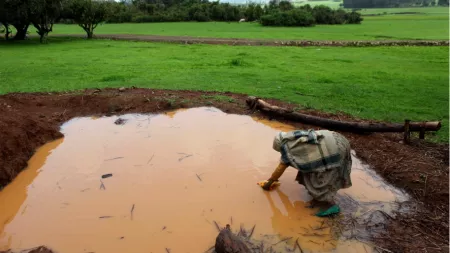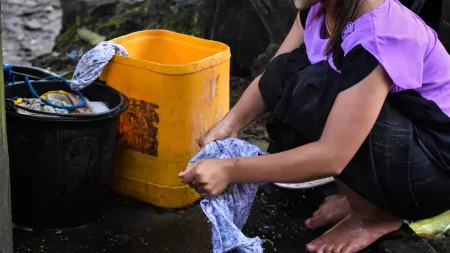The Hague, June 14, 2023 - New analysis of the latest climate finance plans submitted to the UNFCCC by 26 wealthy countries demonstrates there is no chance of achieving 50/50 balanced financial support for climate mitigation and adaptation in the near future, CARE has found. CARE found that only ten contributors included quantitative adaptation finance targets in their most recent biennial submissions: Canada, Denmark, France, Japan, the Netherlands, New Zealand, Norway, the United Kingdom, the United States, and the European Commission. When combined, these pledges add up to approximately USD 14.3 billion of adaptation finance annually.
This falls far short of the USD 50 billion agreed at COP15 in 2009, when wealthy countries committed to USD 100 billion annually, split evenly between adaptation and mitigation. Three of the biggest contributors, Japan, France, and the United States, also indicate that adaptation will make up less than half of their total climate finance, making balance unachievable in the coming years.
John Nordbo, senior climate advisor from CARE Denmark and one of the report’s authors said: "For the 40% of people living on this planet that are severely impacted by climate change, giving up is not an option and adapting is the only path forward. In some cases, if you stop adapting, you don’t eat. The impacts are intensifying and the needs are only increasing, but a close look at climate finance plans from wealthy countries proves they are still failing to define substantiated, attainable pathways towards achieving their financial pledges, particularly on adaptation."
"Big emitting countries are not living up to their financial commitments to support adaptation efforts, and their climate finance plans show that they do not intend to do so in the coming years,"says Nordbo.
As a result of insufficient action by major emitters, climate impacts are steadily worsening. Countries that have contributed minimal carbon emissions are facing an onslaught of climate impacts that threaten homes, lives, nutrition, and livelihoods. These impacts are disproportionately impacting the most vulnerable, threatening to roll back progress already made in addressing poverty and gender inequality. It’s estimated that climate change could push an additional 132 million people into extreme poverty by 2030.
Adaptation is an essential part of managing the humanitarian, public health, political and business risks that climate change presents. The IPCC has highlighted the potential for feasible and effective adaptation to reduce the risks for both people and nature, but states current financial flows are insufficient.
Despite wealthy countries recognizing this urgency and agreeing to double adaptation finance commitments by 2025 at COP26 in Glasgow, 16 of the 26 finance submissions assessed by CARE did not feature firm financial pledges for adaptation, only weak, qualitative statements in support of financial balance, or in some cases nothing at all.

Marlene Achoki, Climate Justice Co-Lead for the CARE Climate Justice Center, said: "Without finance, humanity will continue to face increased costs and greater climate risks, especially in developing countries."
According to UNEP, annual adaptation needs in developing countries are estimated to be USD 160-340 billion by 2030 and USD 315-565 billion by 2050. In Hollow Commitments 2023, CARE found that wealthy countries’ climate finance plans came to approximately USD 57 billion a year for both adaptation and mitigation. Even this figure is generous, as it assumes that countries that did not lay out quantitative pledges will continue to provide support as they have in the past, and that all contributors will deliver on their pledges, when some are currently failing.
The submissions show that countries are heavily relying on other contributors like multilateral development banks and the private sector to deliver what is left of the agreed USD 100 billion. These donors offer most of their support in loans and lack the ambition or motivation to prioritize adaptation, which is most suitably provided as grants. These funds are therefore much less likely to support adaptation or flow to countries where it is needed the most.
It is critical that impacted communities, including women and girls, have access to resources that enable them to lead adaptation efforts, build resilience and thrive in these uncertain and changing conditions,”urges Marlene Achoki.
Instead, climate finance has to be accessible for locally-led groups and directly empower and enable vulnerable communities, particularly women and girls. Only a meager four of the 26 countries assessed (France, Germany, New Zealand and the United States) presented targets for gender-responsive finance or stated their intention to increase the levels of gender-responsive finance they provide.
All wealthy countries must redouble their efforts to plan their future climate support. This will ensure predictability and that the most vulnerable countries and people are prioritized. They also need to produce a clear roadmap detailing how they will deliver on their COP26 undertaking to at least double adaptation finance by 2025, as a step towards achieving the long-promised balance between mitigation and adaptation finance.
For media inquiries please contant: Juliet Perry, CARE Climate Justice Center Communications Lead, via: [email protected] or +31615574513
Note to Editors:
The report authors and other CARE experts are available for interview remotely and at the Bonn Climate Conference.
